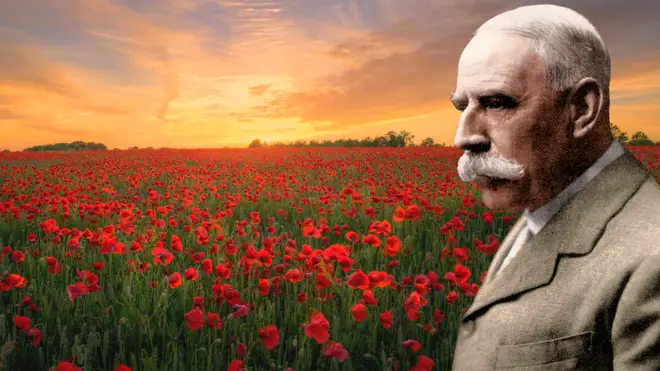15 reflective pieces of classical music for Remembrance Day
11 November 2024, 09:27 | Updated: 11 November 2024, 10:13

A selection of beautifully reflective classical music, from hymns to reflective orchestral and choral works, to mark Remembrance Day.
Listen to this article
Loading audio...
Remembrance Day, held around the country on 11 November, marks the date the First World War ended in 1918.
Here are some beautiful, reflective pieces for remembrance, as we remember those who have lost their lives in world wars and other military conflicts.
Read more: What is The Last Post and why is it played on Remembrance Day?
-
Elgar – Nimrod
Quintessentially British, ‘Nimrod’ from Elgar’s Enigma Variations is imbued with a sublime pathos. The profound beauty and reflective nature of the music make it a favourite among those seeking a moment of calm.

King Charles on his love for Elgar's abiding melody 'Nimrod'
-
The Last Post
The mournful solo bugle with its sparse melodic military call is played at services throughout the country on Remembrance Sunday. Respectful and regal, the march-like rhythms gradually die away until the music comes to rest on a long held note.

Poppy Fields | Last Post | Remembrance 2023 | The Bands of HM Royal Marines
-
Butterworth – The Banks of Green Willow
A beautiful piece of pastoral music, conjuring idyllic scenes of rolling countryside. Butterworth composed the piece in 1913, and it was first performed in the following year. He was killed at the age of 31 during the Battle of the Somme in 1916.

Edward Elgar - Sospiri, for cello, harp and strings | Amsterdam Sinfonietta
-
Britten – War Requiem
Britten’s stunning War Requiem sets poetry by war poet Wilfred Owen alongside traditional Latin Requiem mass texts. It was commissioned to be performed in Coventry Cathedral, marking its consecration after the original building was destroyed in 1940.

Britten: War Requiem / Rattle · Rundfunkchor Berlin · Berliner Philharmoniker
-
Fauré – Elegy
One of the most mournful cello melodies in all of the classical canon, Fauré’s Elegy captures an impressive range of emotions. From gut-wrenching anger to heartfelt sorrow, fleeting memories of happiness and mournful cries, the beautiful music communicates directly from the soul.

Élégie, Fauré – Gautier Capuçon & Malta Philharmonic Orchestra
-
Walton – Pieces from A Wartime Sketchbook
A stately selection of music from the wartime composer, who was exempt from British military service during the Second World War so he could write the music for propaganda films.
Read more: This Polish wartime composer’s music lay buried in a suitcase in his garden. Now, it lives again.

A Wartime Sketchbook (William Walton arr. Hindmarsh), RNCM Brass Band
-
Finzi – Farewell to Arms
This pacifist masterpiece, Farewell to Arms, was composed in 1944 as Finzi dealt with the realities of the First World War. The beautiful music is scored for tenor and small orchestra.

Gerald Finzi, 'Farewell to arms'
-
Carwithen – Suffolk Suite (I. Prelude)
British classical and film composer Doreen Carwithen’s final major composition opens with a trumpet fanfare, followed by a stately melody in the strings. Evocative music, befitting a time of remembrance.

Suffolk Suite: I. Prelude. Moderato
-
Duruflé – Requiem
Many composers set the text to a Requiem mass, but far fewer chose to set the final text of the ‘In Paradisum’. The text tells of the soul finally coming to rest in Heaven with God, and Duruflé’s setting brings the words to life in an angelic outpouring of praise.

Duruflé - REQUIEM - At Saint-Eustache [4K] | The Choir of Trinity College Cambridge
-
Vaughan Williams – Dona Nobis Pacem
This cantata, written in 1936, is a plea for peace in the face of the threat of impending war. It takes its text from the Mass, poems by Walt Whitman, a political speech, and sections of the Bible. The words ‘Dona nobis pacem’ (grant us peace) punctuate the piece.

Ralph Vaughan Williams' Dona Nobis Pacem - La Jolla Symphony and Chorus
-
Elgar – Sospiri
Originally intended as a light-hearted counterpart to ‘Salut d’amour’, Elgar realised his poignant music, written shortly before the start of the First World War and first performed in August 1914, was worthy of a more intense title. The word he chose, Sospiri (‘Sighs’), is wonderfully descriptive of the expansive violin music, accompanied by flowing harp.

Edward Elgar - Sospiri, for cello, harp and strings | Amsterdam Sinfonietta
-
Kelly – Elegy for Strings ‘In memoriam Rupert Brooke’
The Australian and British composer Frederick Septimus Kelly wrote his Elegy for Strings at base camp at Gallipoli in 1915 in memory of his friend, poet Rupert Brooke. Kelly was killed in action during the First World War in November 1916.

Frederick Septimus Kelly - Elegy for strings in Memoriam Rupert Brooke - St. George Quintet
-
Howells – Requiem
Howells did not serve in the First World War after he was diagnosed with Graves’ disease in 1915. He was given three months to live, but survived until 1983. His transcendental Requiem was published in 1980, almost 50 years after it was first composed.

Herbert Howells - Requiem aeternam (1)
-
Gurney – In Flanders
Gurney enlisted as a soldier in the Gloucestershire Regiment in 1915, but suffered a breakdown in March 1918, apparently as a result of shell shock. He wrote this song before he was declared insane in 1922, and spent the last 15 years of his life in mental hospitals.

In Flanders, Ivor Gurney
-
Elgar – Spirit of England
Completed in 1915, Edward Elgar was inspired to write this piece by his friend Sir Sidney Colvin, setting the famous text by Laurence Binyon. “My portion of this work I dedicate to the memory of our glorious men, with a special thought for the Worcesters,” said Elgar.

Edward Elgar: The Spirit of England, Op.80 (1917)










































